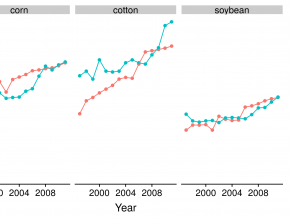Superweeds: A Mutating Problem
Superweeds have been in been in the news a lot over the last few months. Most of the recent coverage has been related to new 2,4-D resistant crops that were recently approved by the USDA and the new herbicide formulation (2,4-D plus glyphosate) that the EPA is reviewing. Marc Brazeau recently wrote a compelling piece arguing that our focus on superweeds in GMO crops draws attention away from solutions that could really help make modern agriculture more sustainable. I’ve written about …
Superweeds: A Mutating Problem Read More
